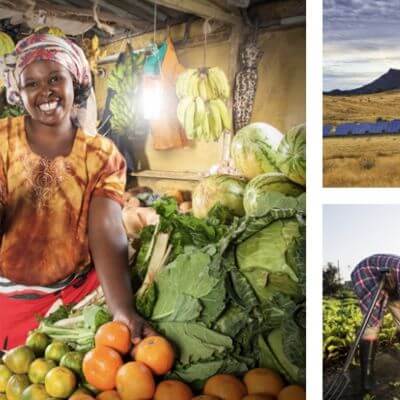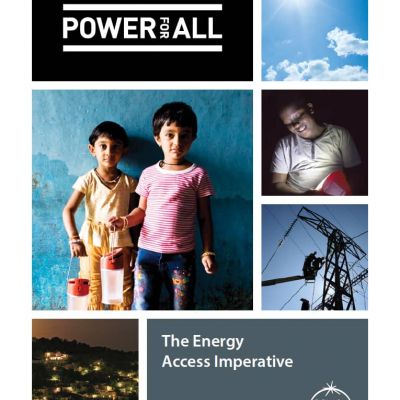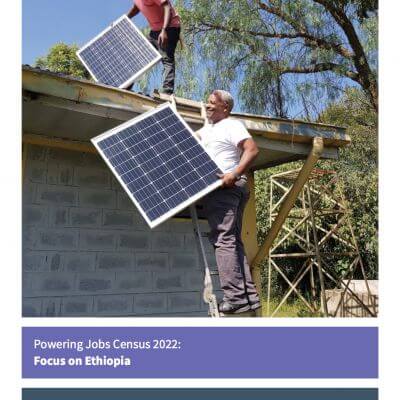The modern, fossil-fueled agrifood system is a significant contributor to climate change, accounting for a third of GHG emissions. Its dependence on fossil fuels, combined with inequitable access to resources, renders it unsustainable.
There is a better path to universal energy access: market-based distributed solutions that directly engage the energy impoverished in creating their own (renewable) energy and controlling their own destinies.
You can download the Energy Access Workforce Ethiopia report to learn about the victories, challenges, and possibilities the decentralized renewable energy (DRE) sector brings.
Download the Powering Jobs Census 2022: The Energy Access Workforce Kenya report to learn how the decentralized renewable energy sector is steadily recovering from the negative impacts of COVID-19. Almost 3,000 jobs were lost in 2020 and 2021 due to a decline in the sales of Solar Home Systems.
Download the Powering Jobs Census 2022: The Energy Access Workforce Uganda report to learn the challenges still facing the decentralized renewable energy (DRE) sector and its job growth in the country due to COVID-19 and the measures put in place by the government.
Download the Powering Jobs Census 2022: Focus on Nigeria to learn how the decentralized renewable energy (DRE) sector has been growing rapidly and delivering clean and affordable energy, particularly to remote rural communities and is now also a major source of good and stable jobs, nearly matching those in the country’s oil and gas sector.
Download the Powering Jobs Census 2022: Focus on India, to understand the growing employment opportunity within the decentralized renewable energy (DRE) sector and to learn how the sector's job growth bounced back from the devastating COVID-19 pandemic.
Download the Powering Jobs Census 2022: The Energy Access Workforce to learn how decentralized renewable energy (DRE) job growth bounced back from the devastating COVID-19 pandemic.
The report ‘Future-Ready Jharkhand RE-Powering Health Sector in Jharkhand’ explores how decentralised energy can be an enabler of change for the health sector in Jharkhand.
Download the Powering Jobs Census 2019: Focus on Nigeria, to understand the growing employment opportunity within the decentralized renewable energy (DRE) sector, and within the communities gaining access to electricity for the first time. In Nigeria, direct, formal DRE jobs are expected to boom more than 10 times by 2022-23.
Download the Powering Jobs Census 2019: Focus on India, to understand the growing employment opportunity within the decentralized renewable energy (DRE) sector, and within the communities gaining access to electricity for the first time. In India, direct, formal DRE jobs are expected to double to by 2022-23.
Download the Powering Jobs Census 2019: Focus on Kenya, to understand the growing employment opportunity within the decentralized renewable energy (DRE) sector, and within the communities gaining access to electricity for the first time. In Kenya, direct, formal DRE jobs are expected to grow 70% by 2022-23.
Download the Powering Jobs Census 2019: The Energy Access Workforce, to understand the growing employment opportunity in the decentralized renewable energy sector in sub-Saharan Africa and Asia, and for the communities gaining access to electricity for the first time. Learn more about the Powering Jobs campaign at powerforall.org/poweringjobs
Utilities 2.0: Integrated Energy for Optimal Impact explores how working together, centralized and decentralized energy can transform their national energy systems into robust networks that deliver reliable, affordable, universal access for all.
This research paper explores the concept of an energy access dividend that assigns economic, social and environmental value to the time it takes for households, businesses and communities to obtain the benefits associated with electricity access.
Despite the U.N.’s goal of ensuring access to affordable clean energy for all people by 2030, default approaches—primarily extending conventional electricity grids—are not meeting the needs of the one billion-plus energy impoverished, who largely live in rural areas.
Seeking the fastest path to universal energy access, Power for All has identified three specific courses of action that Multilateral Development Banks (MDBs) can pursue in support of decentralized renewables in order to accelerate clean energy access.
Type:

































